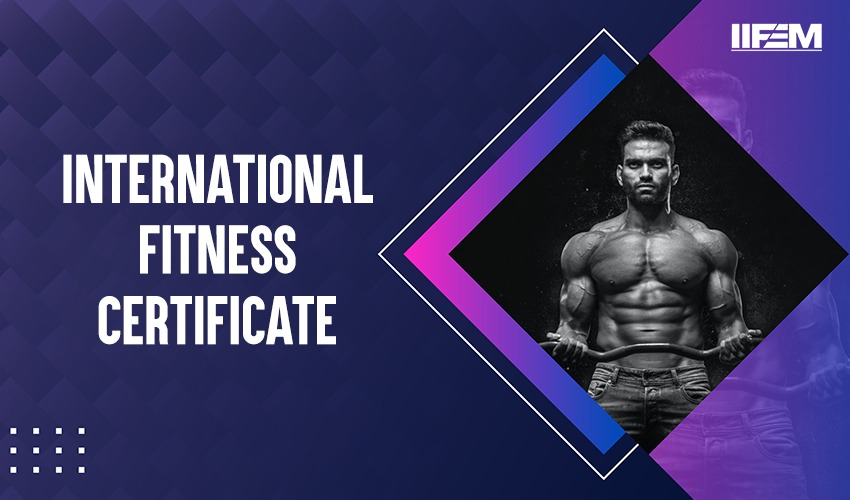
Trainer vs Coach What’s the Difference and Why It Matters for Your Career
In the fitness world, the titles "trainer" and "coach" are often used interchangeably, but they represent distinct roles. Understanding the difference between a trainer and a coach is essential for professionals aiming to stand out and grow in their careers. Each path brings unique responsibilities, goals, and client expectations.
Globally, the demand for personal fitness trainers is booming. The market is projected to grow from USD?45.6?billion in 2025 to USD?85.3?billion by 2035, with a steady CAGR of 5.3%
What Does a Trainer Focus On?
A professional personal trainer is mainly responsible for physical conditioning. They provide structured workouts, demonstrate proper form, and monitor progress. Their role is rooted in technical instruction—helping clients execute exercises safely and effectively. Trainers rely heavily on knowledge of anatomy, biomechanics, and strength programming to guide sessions.
How Coaching Differs From Training?
While a trainer focuses on the physical aspect, a coach also addresses mindset, lifestyle, and long-term behavioral changes. Coaches dig deeper into motivation, accountability, and emotional barriers. They often help clients set goals beyond reps and sets, nurturing discipline and personal growth throughout the journey.
As legendary coach John Wooden once said:
“A good coach can change a game. A great coach can change a life.”
Client Relationships in Both Roles
A trainer may work with someone for a few sessions to teach specific movements. A coach often builds longer-term relationships, helping clients adopt healthier habits over time. Coaches ask more questions, offer more listening, and personalize guidance based on personality and lifestyle factors.
Program Design Approach
Trainers typically build structured fitness programs centered around goals like weight loss or muscle gain. Coaches go a step further by adjusting these plans to suit evolving life circumstances, energy levels, or mindset. Their programs are more adaptive, reflecting the client’s entire life context.
Communication Style and Motivation
A trainer offers instruction and feedback based on performance. A coach motivates through behavior change techniques, guided reflection, and positive reinforcement. Coaches help clients find internal motivation, making success more sustainable in the long run.
Educational Pathways and Certifications
To become a professional personal trainer, one usually completes certifications focused on anatomy, exercise science, and safety. Coaches may pursue additional education in psychology, behavior change, and habit formation. While both roles require expertise, the coach's scope is often broader.
Which Role is Right for You?
Those passionate about teaching movement and seeing quick physical results may prefer being a trainer. Those drawn to mindset work, lifestyle design, and long-term transformations might thrive more as a coach. Both roles are impactful but suit different personality types and strengths.
Earning Potential and Business Opportunities
Trainers often earn income through one-on-one or group sessions. Coaches may offer premium programs, ongoing mentorship, or digital products. With online fitness coaching on the rise, combining both skill sets increases your marketability and income potential.
How to Combine Both Roles for Maximum Impact?
Being both a trainer and coach allows professionals to address both physical execution and deeper client needs. A dual approach leads to better results, higher client satisfaction, and stronger retention. Building skills in both areas creates a well-rounded fitness business.
Tracking Progress with Modern Tools
To function effectively as both a trainer and coach, structured tracking is essential. Tools like the Fitness Log Book from IIFEM help trainers and clients log workouts, meals, and mindset notes. Platforms like FLUID make it easier to communicate, coach, and adjust programs in real-time, offering a seamless client experience.
How IIFEM Supports Career Growth for Trainers and Coaches?
IIFEM offers programs tailored to both roles. The Advanced Personal Trainer Course focuses on workout design, injury prevention, and advanced programming—perfect for developing as a professional fitness trainer.
Courses like the 8-Week Weight Loss Program, Yoga for Muscle Building, and Diet Management Specialist provide coaching frameworks to support holistic transformations.
By combining structured education with real-world tools like the Fitness Log Book and FLUID, IIFEM helps professionals elevate their services, enhance client outcomes, and stand out in a competitive fitness career. Whether you're a trainer, coach, or both, mastering these skills opens new doors for impact and income.
Faqs
1. What is the difference between a fitness trainer and a coach?
A trainer focuses on physical conditioning, exercise technique and workout plans, while a coach addresses mindset, motivation, accountability and long-term lifestyle changes for holistic client transformation.
2. Which career is better: personal trainer or fitness coach?
It depends on your strengths. Trainers excel in exercise instruction and immediate results, while coaches thrive in guiding behavior, motivation and long-term personal growth. Combining both enhances impact and income potential.
3. Can I be both a trainer and a coach?
Yes. IIFEM programs teach technical skills and coaching techniques. Combining both roles allows professionals to address physical execution and mindset, improving client satisfaction, retention and overall results.
4. How does IIFEM support trainers and coaches in career growth?
IIFEM provides structured courses, real-world tools like the Fitness Log Book and FLUID platform access, helping professionals develop technical, coaching and business skills to thrive in fitness careers globally.
5. What certifications does IIFEM offer for trainers and coaches?
Courses include Advanced Personal Trainer, Diet Management Specialist, Yoga for Muscle Building, and 8-Week Weight Loss Program. These cover workout design, nutrition, behavior change and holistic coaching strategies.
Category
Recent Blog

Why is insulin neede... Read more
July 05,2023
10 Tips for Strength... Read more
August 14,2023
Sample Strength and ... Read more
September 06,2023
Why are some lifters... Read more
September 15,2023
Why do Barbells and ... Read more
September 22,2023
Secret Routine to Bu... Read more
September 26,2023
When to use Insulin,... Read more
September 28,2023
Why lifters should u... Read more
September 29,2023
What is power traini... Read more
October 09,2023
The Future of Fitnes... Read more
October 17,2023
Why Pursue a Fitness... Read more
October 21,2023
Career Paths for Cer... Read more
October 31,2023
Elevating Your Perso... Read more
November 21,2023
Gym Safety Correctiv... Read more
December 26,2023
5 Different Types of... Read more
December 27,2023
Elevate Your Fitness... Read more
December 28,2023
Embark on Your Fitne... Read more
January 24,2024
Mastering Nutrition ... Read more
January 24,2024
Building Strength wi... Read more
January 27,2024
Boost Your Career: B... Read more
January 27,2024
7 main reasons why y... Read more
February 15,2024
Unlocking Essential ... Read more
February 19,2024
Unlock Your Fitness ... Read more
February 20,2024
Unveiling the Path t... Read more
February 28,2024
How to choose the ri... Read more
February 29,2024
Strengthening Weak S... Read more
March 20,2024
How a Fat Loss and E... Read more
March 27,2024
Transformative Insig... Read more
March 27,2024
The Importance of a ... Read more
April 10,2024
Mastering the Art of... Read more
April 22,2024
Unlocking Your Caree... Read more
April 23,2024
The Evolution of Per... Read more
May 27,2024
Elevate Your Fitness... Read more
May 28,2024
Choosing the Right P... Read more
June 25,2024
Role of Protein in F... Read more
June 26,2024
Career Opportunities... Read more
June 27,2024
How Fitness Certific... Read more
July 29,2024
Building a Successfu... Read more
July 30,2024
Qualities to Look fo... Read more
August 21,2024
How Gym Trainer Cert... Read more
August 28,2024
How Fitness Trainer ... Read more
September 20,2024
The Role of a Person... Read more
September 23,2024
Immunity Boosting Pl... Read more
October 17,2024
How Fitness Trainers... Read more
October 22,2024
Transform Your Fitne... Read more
October 28,2024
Certified vs. Uncert... Read more
November 22,2024
The Role of Nutritio... Read more
November 25,2024
The Importance of Co... Read more
December 28,2024
5 Powerlifting Train... Read more
December 28,2024
How Personal Trainer... Read more
January 24,2025
Essential Online Nut... Read more
January 25,2025
How Personal Trainer... Read more
January 27,2025
5 Immunity-Boosting ... Read more
March 01,2025
What to Look for in ... Read more
March 01,2025
The Impact of a Pers... Read more
March 27,2025
The Benefits of Beco... Read more
March 28,2025
How to Choose the Ri... Read more
April 24,2025
Turbo Test: Unlockin... Read more
April 25,2025
How to Build a Perfe... Read more
April 29,2025
10 Powerful Yoga Asa... Read more
May 24,2025
How to Track Your Ca... Read more
May 26,2025
Fast-Track Your Fitn... Read more
May 28,2025
Top Career Paths You... Read more
May 29,2025
10 Reasons to Enroll... Read more
June 23,2025
How to Turn Your Pas... Read more
June 28,2025
How IIFEM Plans to C... Read more
July 01,2025
Go Global with IIFEM... Read more
July 11,2025
How to Avoid the Top... Read more
July 22,2025
No English No Proble... Read more
July 25,2025
How Education Can El... Read more
August 19,2025
Real Stories from II... Read more
August 20,2025
Why Gym Owners Prefe... Read more
August 26,2025
How Science Based Tr... Read more
August 31,2025
Why an International... Read more
September 10,2025
What Makes IIFEM the... Read more
September 15,2025
How to Build a Succe... Read more
September 22,2025
Your Passion and Our... Read more
September 27,2025
Fat Loss & Endurance... Read more
October 16,2025
Benefits of Whey Pro... Read more
October 21,2025
Strength and Conditi... Read more
October 27,2025
From Trainer to Gym ... Read more
October 29,2025
Powerlifting Trainin... Read more
November 12,2025
Pre-Workout vs Post-... Read more
November 17,2025
Building a Hybrid Fi... Read more
November 19,2025
Why Most Weight Loss... Read more
November 21,2025
Why Great Coaches Do... Read more
December 18,2025
Integrating Yoga for... Read more
December 18,2025
From Fitness Coach t... Read more
December 18,2025
Personal Trainers Sa... Read more
January 16,2026
Diploma in Gym Manag... Read more
January 16,2026



